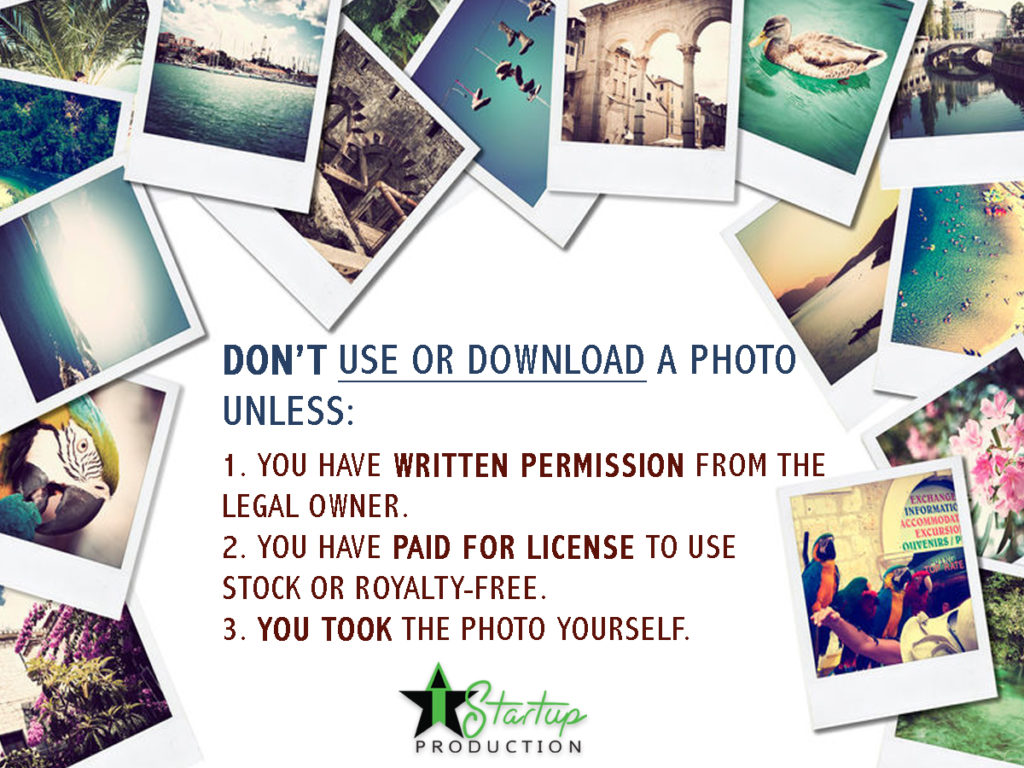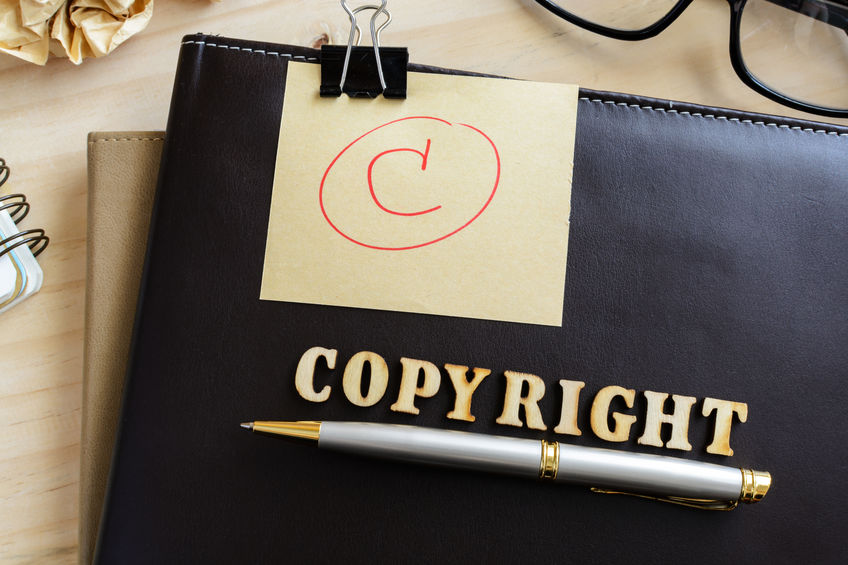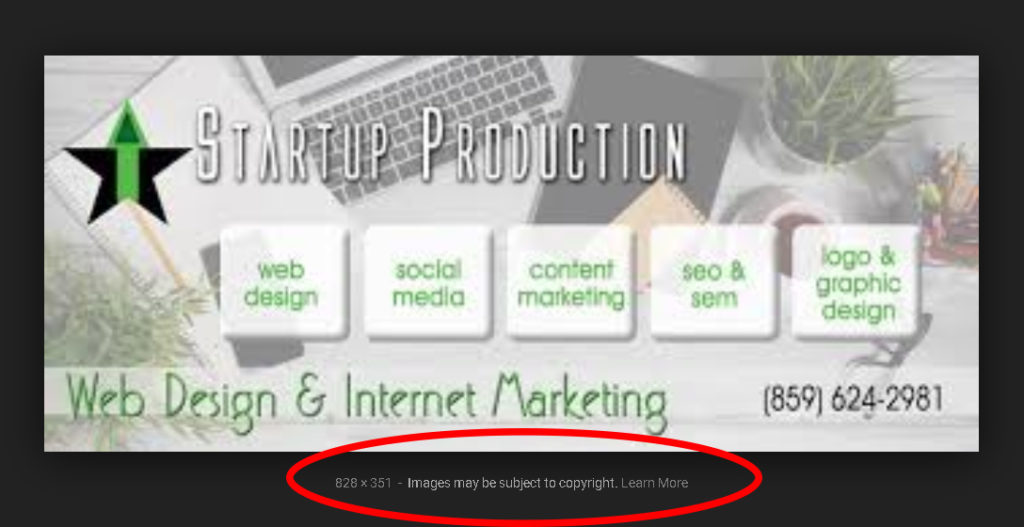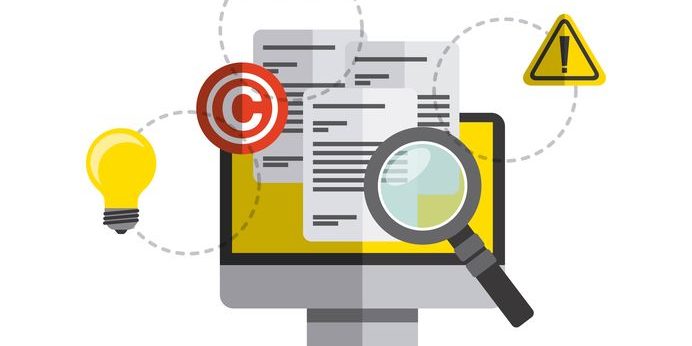Ask yourself:
- Have I ever right clicked on an image or photo from Google images (or any other search engine) and saved that image to your phone, tablet or desktop without written permission to do so or paying for a license to use it?
- Have I ever shared that image/photo privately in an email or file-sharing app?
- Have I ever posted that image/photo on social media?
- Have I ever posted that image/photo on your (or someone’s) website or blog?
- Have I ever used that image on any personal or commercial printed materials?
If you have answered yes to ANY of the questions above, you have committed Copyright Infringement, even if you did so unwittingly or without any malicious intent. It does not matter if you downloaded a photo and used that photo for a non-profit, a religious organization or any non-commercial purposes. If any of that shocks you, you’re not alone. When I train my clients, they are ALWAYS shocked to learn what copyright infringement is and what the penalties are. So let’s start by defining it:
“What is copyright infringement? As a general matter, copyright infringement occurs when a copyrighted work is reproduced, distributed, performed, publicly displayed, or made into a derivative work without the permission of the copyright owner. Who is an author? Under the copyright law, the creator of the original expression in a work is its author. The author is also the owner of copyright unless there is a written agreement by which the author assigns the copyright to another person or entity, such as a publisher. In cases of works made for hire, the employer or commissioning party is considered to be the author. See Circular 30, Works Made for Hire.” – Copyright.gov

While it’s understandable to protect rights of intellectual property owners, there are some who are taking advantage of the laws to make a career of suing those ignorant of the laws, known as Copyright Trolls. These trolls make money when someone uses their photo/image on their blog, website, social media or any other channel, for commercial, non-profit or personal use.
“A copyright troll is a party (person or company) that enforces copyrights it owns for purposes of making money through litigation, in a manner considered unduly aggressive or opportunistic, generally without producing or licensing the works it owns for paid distribution.” Wikipedia
Why you need to understand Copyright Infringement for your Internet Marketing Strategy

You may be wondering why I’m discussing Copyright on a website blog that is focused on Internet Marketing. Digital Marketing is about content, creating lots and lots of content consistently on various subjects and in a variety of channels including your website, blog, email newsletters, social media, directories, and bookmarking sites. “Content is King” in the world in SEO so as I spend time with my clients about the importance of publishing original content, I also include time to talk about the absolute requirement to only publish content (verbiage, photos, infographics, graphics, logos) that is unique and that you LEGALLY OWN. Unfortunately, in those discussions 99% of my clients are completely ignorant of the laws, the penalties and the real possibility it can happen to them. That is why I’m writing this blog.
I want as many people as possible, especially vulnerable small business owners, to avoid the heartache of enduring a lawsuit, huge monetary damages and the real possibility of losing your business.
I understand that in the world of the internet, creating original and visually appealing content can be a challenge because so many still incorrectly think that everything that resides on the internet is free and open to use. IT’S NOT and worse yet, taking a photo, graphic or content from another website without license to do so is ILLEGAL and can incur HIGH FINES.
“The legal penalties for copyright infringement are: Infringer pays the actual dollar amount of damages and profits. The law provides a range from $200 to $150,000 for each work infringed. Infringer pays for all attorneys fees and court costs.” – Perdue.edu
Common Misconceptions about Copyright Infringement
Here are some common misconceptions when it comes to copyright infringement and things I’ve heard from clients during my training sessions:
- “It’s okay because I gave credit to the original owner or shared the URL where I found it.” WRONG! Giving them credit does not alleviate the legal repercussions of using a photo without paying for it. Giving credit without prior permission or license to use is actually flagging your misuse and advertising to the original owner of your crime. Also just because you found the image on a website or social media does not mean the original owner posted it so giving credit to where you found it does not mean that they are necessarily the owner.
- “I can use the photo because there was no copyright notice or metadata on the photo.” WRONG! Anyone’s work is protected under copyright as soon as it’s created, and copyright law protects that work for their lifetime, plus 70 years. Whether the copyright notice is clearly placed on the work or not, had been removed or is missing, it’s still protected under the law. Claiming ignorance does not alleviate the charges if violated. Remember the source you found the photo may not be the original owner, may have removed the copyright notice maliciously or accidentally, and worse yet, it could be a trap laid by a copyright troll.
- “If I get a notice of copyright infringement, I’ll just remove it and it will be fine.” NOT NECESSARILY. If you’re dealing with a reasonable owner, they may just send you a Cease and Desist letter or an invoice to purchase license to use their photo/image. But if you’re dealing with a Copyright troll, they will skip the Cease and Desist letter and straight to threats of lawsuits if large penalties are not paid within a few days.
- “If I receive a notice that I have committed Copyright Infringement, I’ll just ignore it.” SO SO WRONG! First of all, ignoring or not responding to litigation or not showing up to court is an automatic win for the plaintiff at the full extent of the law, which is usually the only cases they win the full $150,000 of damages. Second, you are required by law to respond. Third, by ignoring it you may be throwing the burden of your illegal actions on the other parties in the lawsuit. If you are the guilty party, even if not aware it was illegal, you are responsible to handle the consequences. Those who transfer the guilt of their actions onto others lack character, honesty and moral sense. Besides, you can be counter-sued by the other parties in the lawsuit. Either way, you will eventually pay for your mistakes, whether malicious or not.
“Generally, ignoring a notification and/or cease and desist letter is a bad idea. While it might be tempting to ignore the letter, take down the image, and hope the problem goes away, ignoring a copyright demand letter will cause the copyright holder to spend more resources to protect their copyright. When the copyright holder has to expend additional resources, this can potentially increase the amount of damages that the copyright holder can seek to have enforced against you or your company.” – Legal IO
Prevention is a lot Cheaper than the Cure

The internet is a bit of the wild west when it comes the issues of Copyright Infringement, so first I want to educate my clients and blog readers that it is illegal to download, save, copy and use content that you: (1) do not have written permission to, (2) have not paid for the license to use or (3) have not created the content yourself. I also want to provide warning against Copyright Trolls who have made their careers by preying on those who are uniformed and/or negligent users who have no idea that they have just broken the law and now may owe thousands of dollars.
First of all, using photos or images that you do not own is wrong, it’s a form of stealing someone’s intellectual property. A photo or image took time and care to photograph, create, edit, publish and post. Taking that without paying the owner is taking advantage of someone else’s time and skill for your own profit, entertainment or self-promotion. It’s still illegal, even if you didn’t realize that it is. We all understand that principle. Taking something without asking or paying for it is stealing.
Second, it’s also wrong for people to take advantage of the ignorance of users, by ‘seeding’ (or planting) images over the internet without any meta data or without easily proving verification of ownership in the hopes that once someone uses it illegally, they are now subjects to an expensive lawsuit or lesser, but still expensive settlement. There are professional copyright trolls (some of which are retired copyright attorneys) out there just waiting for someone to use their photo(s), then have a procedure in place to send a threatening letter, and if you don’t pay a settlement within a few days, they will sue you. That process will be financially, emotionally and mentally exhaustive. In some of these cases, the person has sued hundreds of organizations, individuals and companies and made millions in lawsuit damages and settlements.
Here are some examples of recent copyright infringement lawsuits:
- A non-profit is sued for copyright infringement
- A Drop Shipping Supplier sued for copyright infringement
- A national organization sued for copyright infringement
- A blogger was sued for copyright infringement
- A model is sued for copyright infringement for a photo of herself
- There’s even a website dedicated to exposing Copyright-Trolls
Third, you can be sued for Copyright Infringement for the actions of your employees, subcontractors and clients as well as your clients’ employees, subcontractors, and contractors and so on and so on. While you may be innocent, your business can still be liable for thousands of dollars for lawyer costs, legal fees and damages if you lose the case.
“Often in a lawsuit, multiple parties will be included whether directly or indirectly involved, because it’s not about who’s guilty but who has the deepest pockets.” (It’s all about the money.)
An Instructor at a recent Ethics Class I took.
So it’s imperative PRIOR to hiring a contractor or employee to vet them, inform them of the laws, ensure they read and understand the copyright laws. To ensure compliance and prevent future litigation, have all representatives of your company sign a contract where your policies are clearly laid out about handling of content and a detailed list of approved sources where they obtain that content. I created a form that is part of my subcontractor agreement where the law is fully stated, and they are required to read it, sign the form that they have have read and understand the current Copyright and Work for Hire laws. (See a copy of that form. Please feel free to use for your business.)
How Copyright Infringement can Affect your SEO
“Google is now taking into account the number of valid copyright removal notices that they receive for a given website. Sites that receive a high amount of removal notices will be appearing lower in the search results list, lowering both the chances of their site being seen as well as the copyrighted content they host from being misused. In the worst case scenario, a website can even be removed from Google’s search index altogether.” – AMD Law Group
And Google’s had to make some changes to prevent others from falling into legal trouble unwittingly. Announced in February of 2018, Google removed the “view image” button from image search, which will make it trickier to save copyrighted images directly. And later that year they added the statement, “Images may be subject to copyright” in a more prominent way so when you click on any image in Google Image search results, you will see right under each photo.

This all illustrates the fact that the search engines are doing their best to inform and prevent their uses from falling inadvertently into this trap. And they are going to promote the sites that use their own photos, content and graphics.
Just don’t …
To Recap, do not download, share or use Copyrighted Material – or any material … unless you have license to use it. If you have, immediately go through your website, blog, social media and permanently DELETE any photos, images, or content that you cannot verify ownership or license to use. Finally, if it happens, don’t ignore notices of copyright infringement!! If you do get a Cease or Desist letter, then cease and desist usage immediately. If they ask for a reasonable payment, pay it. If they file a lawsuit against you, then consult an attorney and get ready for an eye-opening experience that will alter your life and potentially risk the survival of your business.
So as I’ve been saying for many years now, when adding keyword rich content to your website be original, unique and engaging. Don’t be afraid to be original when it comes to your photos, videos and graphics. If you have to use someone else’s or stock photos, pay for the license to use it.
My Story …
In 2017, a client of mine was notified of usage of copyrighted photo. The photo was NOT UPLOADED by myself or any employee of Startup Production, but a third-party contractor and influencer. As I attempted to intercede and defend the client, the claimant then pulled me into the lawsuit as well. I had previously was under the notion that if you were innocent, you had nothing to worry about but innocence does not prevent a lawsuit being filed, nor does it absolve you from paying lots of money to defend yourself and prove such innocence. The claimant has been termed by others as “copyright troll” and he has sued hundreds of people and organizations over the past 10 years over one photo, as a retired copyright lawyer.
For more information about the claimant:
- https://www.thompsoncoburn.com/insights/blogs/in-focus/post/2019-10-31/the-bell-tolls-for-alleged-copyright-claim-to-skyline-photo
- https://www.theindianalawyer.com/articles/lawyer-photographer-loses-appeal-of-copyright-dismissal-must-pay-more-fees
- http://www.wbiw.com/2019/09/26/lawyer-who-used-photo-to-sue-hundreds-could-owe-defendants-20-million/
- https://www.techdirt.com/articles/20190927/20021543086/copyright-troll-loses-jury-trial-which-might-lead-to-him-paying-legal-fees-multiple-lawsuits.shtml
Unfortunately, due to the actions of the third-party independent contractor, my client’s company and my company were sued. Because of this experience, I have become an advocate of preventing copyright infringement to everyone I speak to including when speaking to clients, leads, colleagues and giving presentations. In most cases, many small business owners do not understand the law nor do they think they are breaking any laws when they copy and/or save photos off the internet that they do not own. I’ve written this blog on this very topic to further educate entrepreneurs, small businesses and startups, as they are most at risk and vulnerable to similar ‘copyright trolls’ who know they do not have the funds to truly defend themselves and are more apt to settle and pay to make the situation go away. Often copyright trolls will ‘seed’ or plant the photo without meta data or copyright notice so others continued to use and continue to make profits for the troll, so be careful of any photo you don’t pay for.
To protect yourself, do not use photos that you have not purchased the license for or have taken yourself or your client had not hired a photographer to take. In this regard, I will not use any photos even if my client gives me unless I go through a series of questions and research of the photo’s source. I also do not use photos or images from any site claiming to offer ‘free stock photos’ as I cannot guarantee the source of those images in many instances so I only use photos that I have paid for from only 2 or 3 reputable stock photo providers. I also terminated any relationships with contractors or third-party content creators or influencers who will not sign my copyright infringement agreement and ascribe to our specific protocols regarding photos and graphics. I was NOT RESPONSIBLE for the lawsuit, and I felt incredible loss (emotionally, physically and financially) during this process, but I have used it as a learning experience and a way to share my story to help others avoid the pain I went through.
I also learned a lot about small business insurance, as my insurance company dropped me mid-lawsuit so I was fully responsible for the financial cost of the lawsuit. (If you would like recommendations on local insurance companies, please call me.) And read my blog about protecting your small business assets: https://startupproduction.com/how-to-protect-your-business-and-your-assets/.
EPILOGUE:
- https://www.indystar.com/story/news/2019/09/27/copyright-case-man-doesnt-own-indianapolis-skyline-photo-jury-finds/3778000002/
- https://www.techdirt.com/articles/20190927/20021543086/copyright-troll-loses-jury-trial-which-might-lead-to-him-paying-legal-fees-multiple-lawsuits.shtml
- https://www.theindianalawyer.com/articles/attorney-photographer-denied-new-trial-ordered-to-pay-172k-in-indy-skyline-photo-suit






